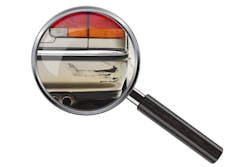Billy Walkowiak began helping out at his father-in-law’s Belmont, N.C., shop, Pack Brothers Collision Center, doing diminished value claims in 2010. New to the industry, it was in that role that he first discovered what he refers to as an alarming industry-wide trend: improper repairs. The majority of vehicles he inspected had structural errors—some that affected the integrity of the vehicle. Those errors (on vehicles that had been worked on elsewhere) were then fixed at Pack Brothers, but they never sat well with Walkowiak.
Instead, it led to a career change. While working for his father-in-law, Walkowiak founded Collision Safety Consultants, which specializes in, among other services, post-repair inspections.
“Seventy-five to 80 percent of the vehicles I see are not structurally repaired correctly,” Walkowiak says.
It’s an alarming issue plaguing the collision repair industry, he explains. And with vehicle complexity only increasing, the need for a greater emphasis on quality control, and post-repair inspections in particular, is critical.
There are third-party organizations, such as Walkowiak’s company, that offer such services, but many shops across the country are also taking matters into their own hands.
A Widespread Problem
There are no quality control systems set up in the majority of body shops, Walkowiak says.
“There are no repercussions, there are no sanctioning authorities to see if someone does a quality repair,” he explains. “Most chains are set up on cycle times. When you’re pushing a tech to turn out as much work as possible, pay as little as possible and add time restraints, people are going to make mistakes.”
Most post-repair inspections are settled quickly. It’s rare that a case has to go to court, Walkowiak explains. If repairs are performed at a direct repair shop, the insurance company will usually force the body shop to buy the vehicle back to avoid the court system. From his observations, the cost of hiring an attorney and dragging the case through the court system is something that most people want to avoid. However, when a case does go to court, Collision Safety Consultants’ track record shows they are more than prepared.
“In the last five years, we’ve had 14 cases that have gone to the next stage, which is getting an attorney. Twelve of the cases settled in favor of the consumer and the two that went to trial were ruled in favor of the consumer,” says Walkowiak.
Better Process, Better Results
Mr. B’s Paint & Body in Albuquerque, N.M., has made vehicle re-inspections a critical component of its workload. The shop performs vehicle inspections for a number of different reasons, including the safety of the vehicle and the buyer—and to help the consumer collect what is properly owed to them, owner Scott Benavidez says.
Creating a process in his shop that puts an emphasis on quality has allowed Benavidez and his team to overcome many of the repair errors plaguing others in the industry, and he says it’s helped to position his business as a trusted authority in the area.
The shop performs three different types of re-inspections:
Used Car Inspections: Mr. B’s Paint & Body completes an inspection with a full report and an estimate of how much previous damage was accurately repaired by previous shops.
Diminished Value: Repairs are checked for completion and diminished value is proven.
Post Repair Re-Inspections: Vehicles are checked for correct repairs and the insurance company is brought in if the vehicle was not completed to industry standards.
What happens after a vehicle is inspected and mistakes have been found? It depends on a number of different factors, but in some cases there are legal ramifications.
“Nobody likes to be outed. I will give a shop a second chance.”
—Billy Waltowiak, Owner, Collision Safety Consultants
“If it’s just a cosmetic repair, we just contact the body shop itself and let them know there are issues that need to be addressed. When it comes to improper repair, and the billed and paid hours were not performed, that’s fraud,” Walkowiak says.
Walkowiak and Benavidez say that the results of a re-inspection could have large repercussions for the shop that performed incorrect work. Reputations can take a hit, not to mention potential legal action. Walkowiak explains that most body shops will agree to perform the necessary repairs or buy the vehicle back, and Benavidez agrees that it’s always beneficial to give the shops the benefit of the doubt and allow them a second chance to make it right. “Nobody likes to be outed. I will give a shop a second chance,” says Walkowiak.
If re-inspections become more prevalent, Walkowiak believes that more shops will be pushed into more hands-on training, which will only improve the industry.
“This can only help our industry so that the vehicles are repaired correctly,”Benavidez says. “We need to make sure the occupants of these vehicles are safe, and that the value of the second biggest investment of their life is kept as high as possible.”

